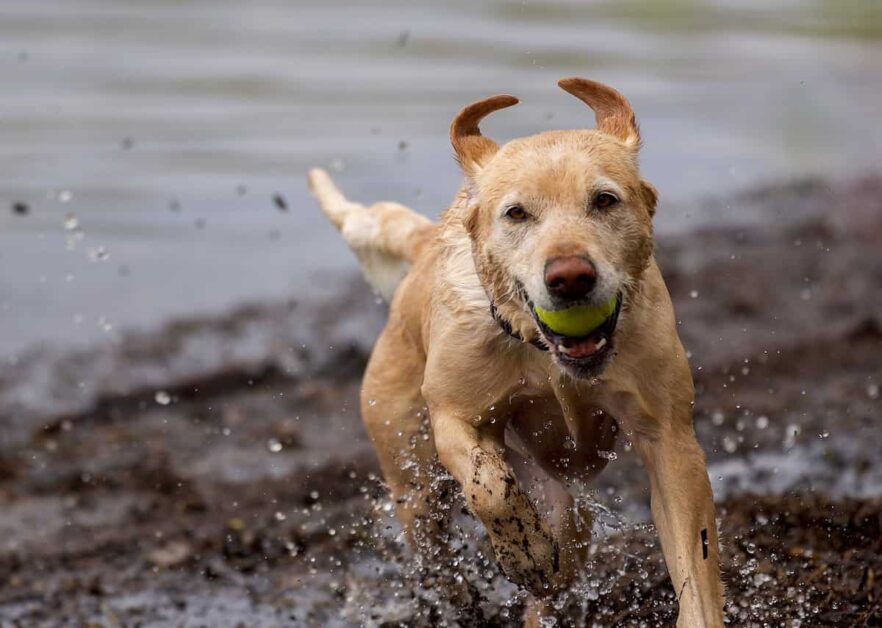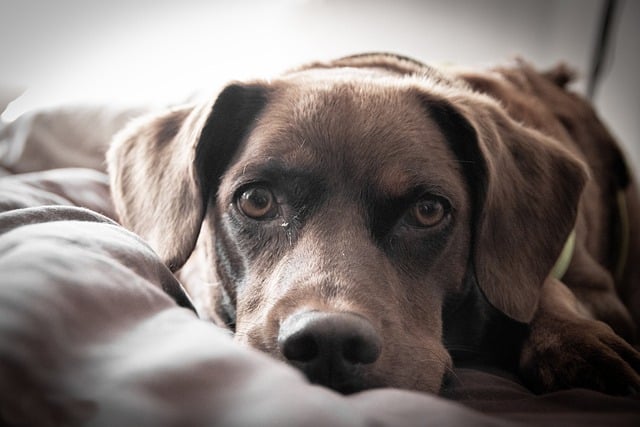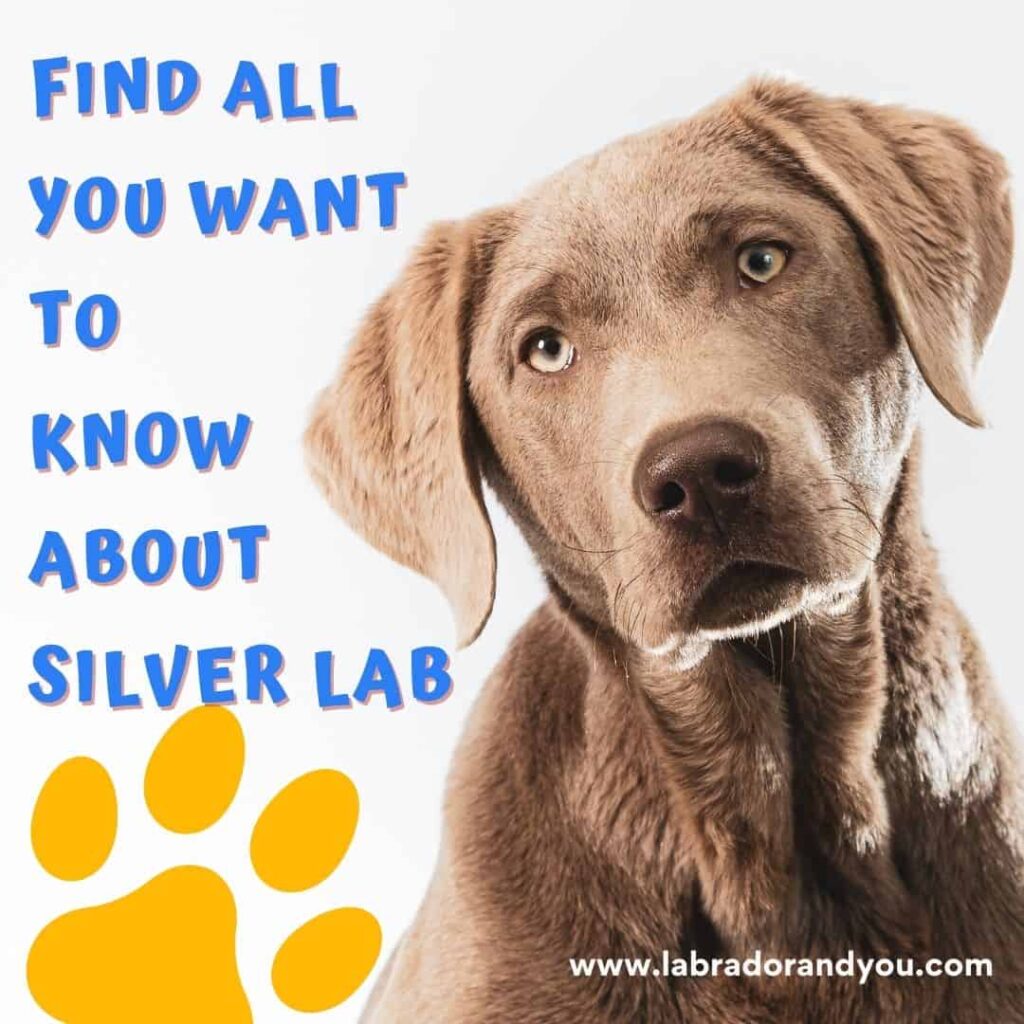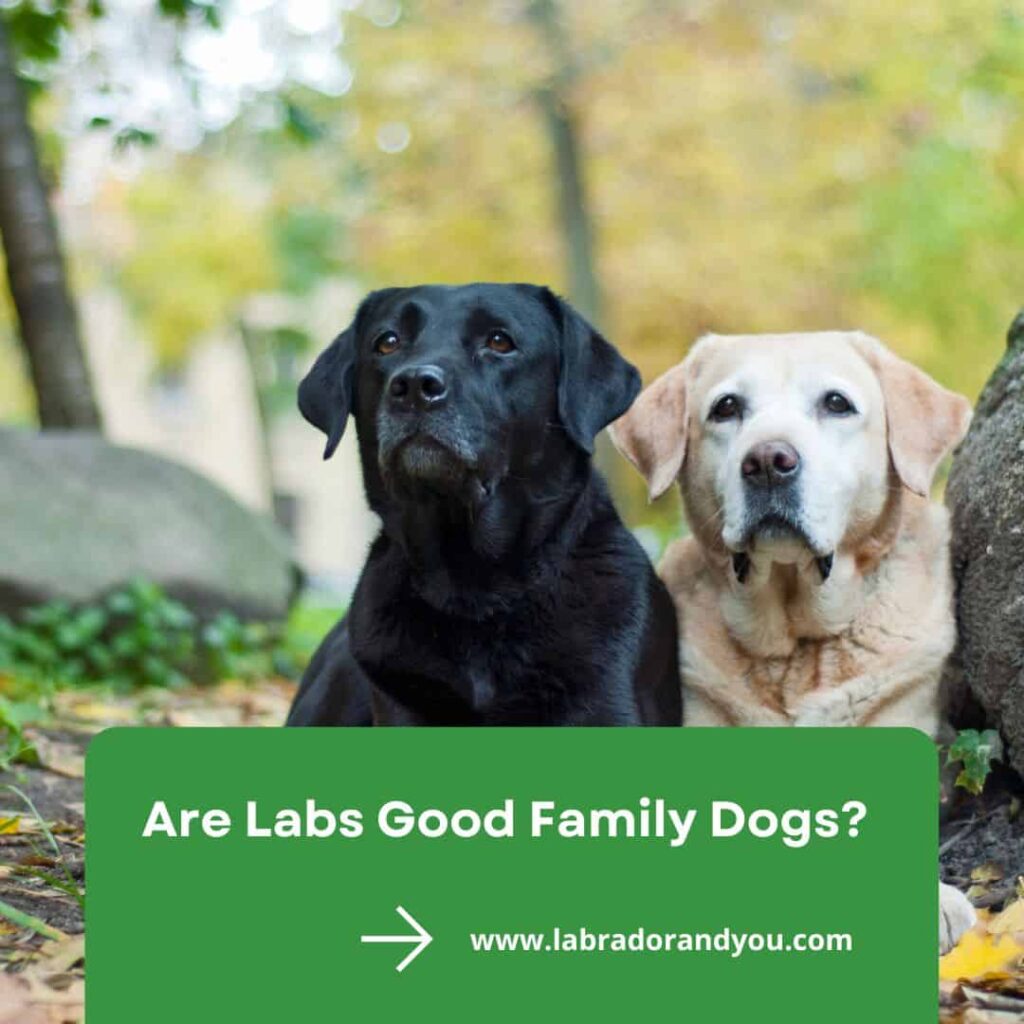While beans are not toxic to dogs, they should only be fed to canines occasionally and in small amounts. Beans contain complex carbohydrates and proteins that can be difficult for some dogs to digest. It’s best to introduce beans slowly and monitor your dog for any intestinal upset.
Can Dogs Eat Beans?
Absolutely! They’re a great variety of beans dogs can enjoy, provided they’re prepared correctly. Beans are rich in essential nutrients like vitamins, protein, fiber, and minerals. They’re highly beneficial for your dog’s health and well-being.
Green beans, a top dog favorite, offer a crunchy treat. They are low in calories yet have a high fiber amount. Beans are also a great snack for overweight pooches trying to shed some extra pounds.
Moreover, the black category of beans presents another safe option with antioxidants that support dog health. They deliver generous quantities of potassium and magnesium, essential for strong bones and healthy muscles.
Ensure these nutritious intakes are part of complete and balanced dog nutrition, not the main course. A moderate approach towards including beans in your pet’s diet is always recommended. It will help avoid digestive upset in dogs or other potential sensitivities to new foods.
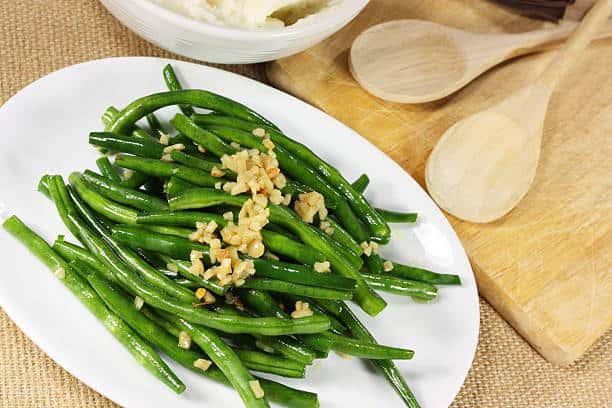
Are Beans Good For Dogs?
Beans pack a nutrient-rich punch that can significantly benefit your dog’s health. Proving to be more than just filler, beans are loaded with vitamins that contribute actively.
They serve as an excellent method of protein which is imperative for healthy tissue and muscle development. Green beans, in particular, stand out in the crowd – they’re low-calorie superfoods rich in fiber.
They are perfect for weight management and promoting digestive health. They also contain Omega-3 fatty acids that enhance coat quality, making it shiny and healthy.
Not far behind are black ones – antioxidant powerhouses. They provide dietary fiber and potassium, aiding heart health and magnesium supporting nerve function.
Also on the list is Lima varieties offering your dog a wholesome combination of fiber, calcium for strong bones, iron enhancing oxygen flow through blood, zinc assisting metabolism function, and magnesium. These are important for nerves, muscles, and the immune system.
We cannot ignore Pinto Beans’ contribution, either! They come packed with antioxidants alongside their valuable nutritional components like fiber and protein. They battle disease-causing free radicals while simultaneously keeping your furry friend feeling full longer between meals.
These Are The Beans That Are Safe For Dogs To Eat
For a healthy diet, dogs can safely enjoy small amounts of green, black, lima, pinto, garbanzo, and kidney beans. Read on to learn more about the benefits of these delicious beans for dogs!
Can Dogs Eat Green Beans As A Treat?
Green beans are more than just a crunchy treat for our four-legged friends. These vibrant veggies make a healthy snack for dogs watching their weight.
The “green bean diet,” endorsed by many veterinarians, offers a satisfying substitute for your pet’s regular food. Feeding green beans can make dogs feel full while reducing calorie intake.
These beans are packed with protein, iron, calcium, and vitamins B6, A, C, and K. Green beans as a treat or food topper, will tickle their taste buds and bolster their health.
Whether you are a devoted ‘dog mom’ or ‘pet dad,’ beans you feed must be freshly cooked and free of spices and high-fat oils. Dogs have green beans for optimal digestion and avoidance of potential upset stomach issues.
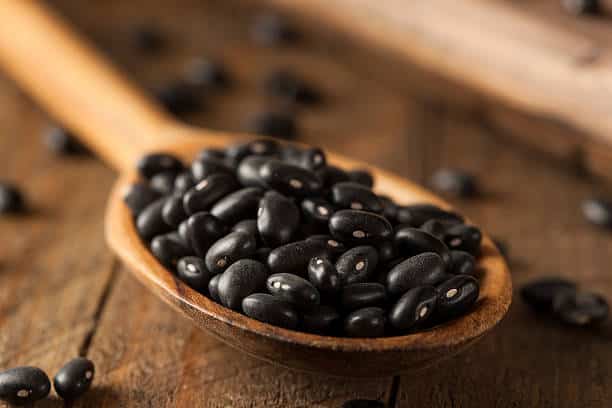
Can I Give My Dog Black Beans?
These beans are not only a delicious addition to your meals, but they can also be a healthy option for your dog. Loaded with protein, fiber, and essential vitamins and minerals, they can provide dogs with nutritional benefits.
They are an excellent source of plant-based protein, important for muscle development and repair. They also contain high levels of fiber, promoting good digestion and helping your dog maintain a healthy weight. These foods are packed with iron, folate, magnesium, and antioxidants.
Can Dogs Eat Canned Black Beans?
Dogs can consume them within limits, including canned ones. They are a good protein, fiber, vitamins, and minerals source. However, keep in mind a few things be it black or canned green beans:
- Plain black: Ensure that the canned varieties you provide to your dog are plain and free from additives like salt, spices, or seasonings. These additional ingredients can be harmful to dogs, especially excessive salt. They can make your dog sick.
- Balance: These beans should only be a small part of your dog’s diet. While they offer nutritional benefits, they should not replace the primary protein source in their diet, which is usually meat-based.
Can Dogs Eat Lima Beans?
Lima beans are a nutritious and safe option for dogs to enjoy. They contain beneficial nutrients like fiber, protein, calcium, iron, zinc, and magnesium. The fiber content in these beans can help promote healthy digestion in dogs while providing essential nutrients.
They also offer a great source of plant-based protein that can be incorporated into your pet’s diet. Hence, these beans can be a healthy choice for their diet.
Can Dogs Eat Pinto Beans?
Pinto beans are nutritious for dogs, with fiber, protein, and antioxidants. The fiber content in these beans can support healthy digestion in dogs and promote regular bowel movements. Furthermore, the protein in these dog beans helps build strong muscles and repair tissues in your pet’s body.
These beans also contain calcium, iron, zinc, and magnesium. They are essential in maintaining bone health, supporting immune function, and aiding in various physiological processes within your dog’s body.
With their nutrient-rich profile, incorporating them into your pet’s diet can positively affect their overall well-being. They are an excellent alternative to dog biscuits.
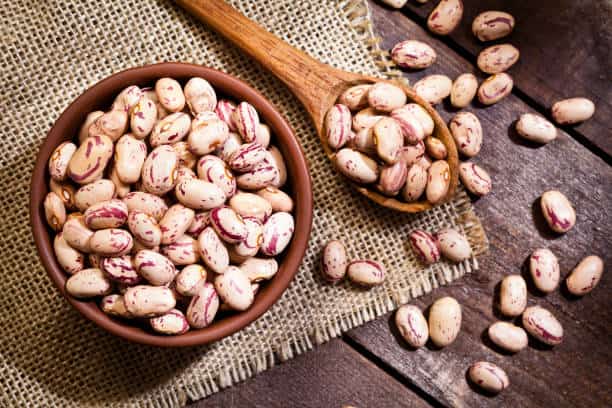
Can Dogs Eat Garbanzo Beans?
Garbanzo beans or chickpeas are a safe and healthy dog option. They contain protein and fiber. Also, they provide a good source of plant-based protein that can benefit dogs with dietary needs or restrictions. Garbanzo beans contain vitamins and minerals like folate, iron, potassium, and magnesium.
Can Dogs Eat Kidney Beans?
Kidney beans are a safe and nutritious option for dogs to enjoy. These offer good protein, fiber, iron, potassium, folic acid, magnesium, and folate source.
Raw kidney beans contain toxins that can harm dogs if not properly cooked or soaked beforehand. Soak dried beans overnight and cook them thoroughly until they become soft. Cooked types are safe and digestible for dogs. Uncooked ones may cause red blood cells to stick together and lead to clogged arteries.
Can Dogs Eat Butter Beans?
Yes, dogs can eat butter beans. These dog beans are a great source of protein, vitamins, and minerals. Raw butter beans are unsuitable for dogs because they contain a compound called lectin that can be harmful if consumed in large quantities. Cooking will neutralize this compound, making the beans safe for your dog.

Can Dogs Eat Navy Beans?
Dogs can consume navy beans safely, given they are properly prepared – thoroughly washed and devoid of seasonings, spices, sugars, garlic, and onions.
These beans can be served plain or combined with a dog-safe protein for a balanced meal. They maintain their nutritional value even when canned. However, fresh navy beans are preferable to minimize preservatives. You can include these beans to your dog’s feeding schedule as a supplement.
Can Dogs Eat Cannellini Beans?
Cannellini beans, or white kidney beans, are safe for dogs to eat in moderate amounts. They are good for protein, fiber, and various vitamins and minerals. These beans should only be given to them as an occasional treat, not a diet staple. Feed your dog beans that are cooked well. Raw or undercooked beans can be difficult for dogs to digest and may cause gastrointestinal upset.
Can Dogs Eat Frozen Green Beans?
Yes, dogs eat green beans that are frozen. While frozen ones aren’t harmful to dogs, they may be hard for some dogs to chew or digest. Here are a few tips:
- Preparation: It’s generally safer to cook green beans, as some dogs have difficulty digesting raw vegetables. Cooking can also make them easier to chew, especially for smaller dogs.
- Seasoning: Avoid giving beans with salt, butter, or other spices or flavors.
- Serving Size: As always, serve beans in limits, including the green ones. Too much food, even a healthy one, can upset a dog’s stomach. These beans should not make up the bulk of your dog’s diet; they should be a supplement to a balanced diet
Can Dogs Eat Great Northern Beans?
Great Northern beans, like other kinds of beans, should be cooked thoroughly and plain without adding seasonings or harmful ingredients. However, some dogs may experience digestive issues such as gas or an upset stomach. Introducing new foods like beans in moderation is always a good idea.
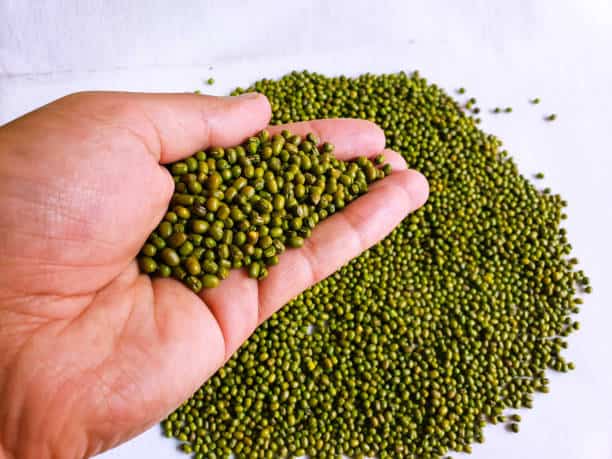
Can Dogs Eat Mung Beans?
Yes, dogs can safely eat mung beans. Mung beans, like other legumes, can be a good option for protein, fiber, and various vitamins and minerals. But, they should not constitute the main part of a dog’s diet and should be in a balanced ratio. As with all beans, don’t add any seasoning, spices, or other ingredients like onion or garlic.
Can Dogs Eat White Beans?
Yes, dogs can safely eat white beans in small amounts. White beans, like many other beans, are a source of protein and fiber.
Can Dogs Eat Edamame Beans Or Soyabeans?
Soybeans, or edamame, can be a safe and nutritious addition to your dog’s healthy diet. These healthy legumes are packed with protein, vitamins, and minerals that can be beneficial. However, soybeans should be prepared plain without any added spices, salt, or soy sauce.
Can Dogs Eat String Beans?
Yes, dogs can eat string beans, also known as green beans. They are a good source of fiber and vitamins and can be a healthy addition to your dog’s diet.
Here Are Beans Your Dogs Should Avoid Always
Here are a few types of beans that are unsafe for your dogs. Avoid adding them to your pet’s diet, as they can make dogs sick.
Can Dogs Eat Baked Beans?
Baked beans may be a staple in our diets, but they are unsuitable for our furry friends. Baked beans should be avoided as they contain molasses, brown sugar, and other spices that can harm your dog.
These ingredients can cause digestive upset and discomfort in dogs, leading to gas, bloating, and diarrhea. Keeping baked beans away from your dog’s food bowl is best to prevent unnecessary health issues.
Can Dogs Eat Refried Beans?
Refried beans can be a delicious addition to your plate, but when it comes to dogs, they should steer clear. These beans are typically cooked with harmful spices like garlic, chili powder, and salt, which can make the dog gassy.
Refried beans are high in fat content, which can lead to obesity or digestive upset in dogs. It’s best to avoid sharing refried beans with your canine companion and opt for safer options like green beans or black beans.
Can Dogs Eat Chili Beans?
Chili beans, commonly used in chili con carne recipes, are unsuitable for dogs. These beans are made with extra sugar and spices that can upset a dog’s stomach. The added seasonings and flavors may also contain onions and garlic, which are harmful to dogs if consumed.
Can Dogs Eat Canned Beans?
Canned beans may seem convenient, but they are not recommended for dogs to eat. These beans are often packed in salt brine or other high-sodium solutions, which can harm your furry friend.
Dogs with heart conditions or high blood pressure should especially avoid canned ones due to their sodium content. Some canned bean varieties may contain added sugars and spices that could upset your dog’s stomach.
But can dogs eat cooked beans? Yes, it’s best to feed your dog fresh or cooked plain beans.
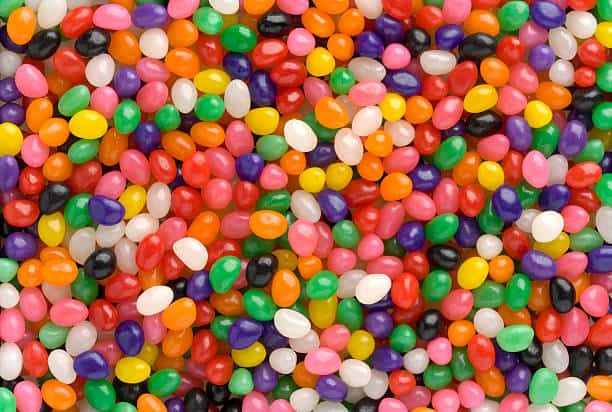
Can Dogs Eat Jelly Beans?
No, dogs should not eat jelly beans or any other type of candy. Many types of candies, including jelly beans, can contain ingredients that are harmful to dogs.
- Sugar: Jelly beans are high in sugar, which is bad for dogs. Excessive sugar intake can lead to obesity, dental problems, and diabetes.
- Artificial sweeteners: Some jelly beans (or other candies) might contain artificial sweeteners like xylitol, which is extremely toxic to dogs. Even a small amount of xylitol can cause low blood sugar, seizures, liver failure, or even death in dogs.
- Artificial colors and flavors: These additives are unhealthy for dogs and could cause adverse reactions.
- Risk of choking or blockage: The small, hard shape of jelly beans poses a choking hazard or blockage risk in your dog’s digestive system, especially for smaller dogs.
Can Dogs Eat Pork And Beans?
Dogs can technically eat pork and the beans themselves. Commercial “pork and beans” cans often contain high sodium, sugar, and other spices or additives that can harm dogs. Here’s why each of these can be problematic:
- Sodium: High sodium levels can lead to dehydration, high blood pressure, and in extreme cases, sodium ion poisoning in dogs.
- Sugar: Excessive sugar can lead to obesity, dental problems, and potentially diabetes.
- Spices and additives: Certain spices and additives, like onion or garlic, can be toxic to dogs.
If you’re considering feeding your dog pork, give them plain, cooked pork (without any added seasonings or sauces) in moderation.
Can dogs eat red beans and rice?
Red beans and rice is a dish that’s often heavily seasoned and contains ingredients like onions, garlic, and certain spices, all of which can harm dogs. Onions and garlic, in particular, are toxic to dogs and can cause anemia that destroys red blood cells.
- Red beans: They should be thoroughly cooked to eliminate a natural compound called phytohaemagglutinin, which can be harmful.
- Rice: Plain white or brown rice can be a good source of dietary fiber for dogs. It is often recommended as a bland diet for dogs with upset stomachs.
Can Dogs Eat Coffee Beans?
No, dogs should not eat coffee beans or any caffeine-containing products. Coffee beans and caffeine can harm dogs and pose serious health risks. Caffeine is a stimulant that affects the central nervous system of both dogs and humans. However, dogs are much more sensitive to its effects than humans.
Consuming coffee beans can lead to restlessness, rapid breathing, increased heart rate, elevated blood pressure, tremors, seizures, and even death in severe cases. The severity of symptoms can vary depending on the size of the dog and the amount of caffeine ingested.
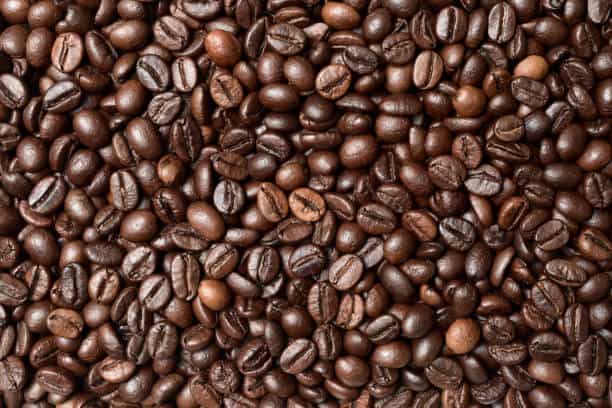
Can Dogs Eat Red Kidney Beans Raw?
No, it is not recommended to feed dogs raw red kidney beans or any raw beans for that matter. In the raw form, they contain a toxin called phytohemagglutinin. It can harm dogs if consumed in sufficient quantities, just like human foods. Phytohemagglutinin can cause gastrointestinal upset, including nausea, vomiting, diarrhea, and abdominal pain. It can lead to more serious conditions, such as pancreatitis, in severe cases.
Can Dogs Eat Fava Beans?
Fava beans or broad beans are among the few beans that dogs must avoid. Broad beans or fava beans can cause vomiting, diarrhea, and abdominal pain in dogs. They contain PHA, which can be toxic to another level and can turn the dog ill.
How To Prepare Beans & Give My Dog?
To ensure the safety and optimal digestion of beans for your dogs, follow these steps:
- Soak the beans overnight in water to soften them and remove any potential toxins.
- Rinse the soaked beans thoroughly to remove any residue or dirt.
- Prepare beans until they are soft and easily mashable. This helps improve digestibility for your dogs.
- Avoid adding harmful ingredients like spices, salt, butter, or high-fat oils to them. Keep it plain and simple.
- Allow the beans to cool down completely before serving them to your dogs.
Many Beans Are Safe And It Is Ok For Dogs
Beans are crucial to your dog’s diet, providing several health benefits.
- Protein is vital for dogs as it helps support muscle development and repair tissues.
- Beans offer a plant-based protein alternative for dogs with sensitivities or animal protein allergies.
- Fiber content in beans aids digestion by promoting regular bowel movements and reducing the risk of constipation.
- Vitamins found in beans contribute to your dog’s overall vitality. For instance, black dog beans contain antioxidants that help protect against cell damage caused by harmful molecules called free radicals.
- Pinto beans provide essential nutrients like iron, which help transport oxygen throughout the body.
- Incorporating beans into your dog’s diet can also benefit their cardiovascular health due to their high potassium content. This mineral helps regulate blood pressure and supports proper heart function.
Possible Allergic Reactions And How To Handle Them?
Possible allergic reactions to beans in dogs include:
- Skin Irritation: Some dogs may develop skin rashes, hives, or itchiness after consuming beans. This could be a sign of an allergic reaction.
- Digestive Upset: Dogs with bean allergies may experience vomiting, diarrhea, or abdominal discomfort. These symptoms can occur shortly after eating beans.
- Respiratory Issues: In rare cases, dogs with severe bean allergies may develop respiratory problems like coughing, wheezing, or difficulty breathing.
- Swelling: Allergic reactions can cause swelling of the face, lips, tongue, or throat in some dogs. This can lead to breathing difficulties and is considered a medical emergency.
Here is how you can handle any allergic reactions –
- Monitor Symptoms: If you suspect your dog is allergic to beans, closely observe their behavior and note any symptoms they exhibit.
- Consult Your Veterinarian: Contact your vet immediately if you notice any signs of an allergic reaction in your dog. They can guide how to manage the situation and recommend appropriate treatment options.
- Stop Feeding Beans: If your pup shows signs of bean allergies, it is essential to avoid feeding them beans or any products that contain beans.
- Seek Medical Attention: If your dog experiences severe symptoms such as difficulty breathing or facial swelling, seek immediate care, as this could indicate an anaphylactic reaction.
- Follow Your Vet’s Recommendations: Your veterinarian may suggest conducting allergy tests or prescribing medication to manage the allergic reactions effectively
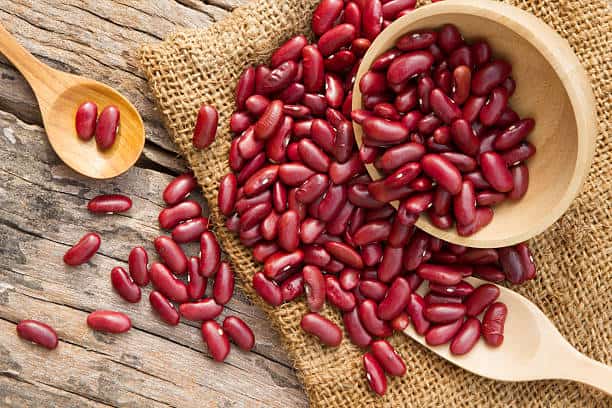
FAQs on Green Beans And Green Bean Diet
1. Can dogs eat beans?
Yes, most dogs can safely eat beans if cooked and unsalted. Beans are good for protein and fiber for dogs.
2. Are there any types of beans that dogs should avoid?
Some beans, like kidney type or certain varieties of canned baked beans, contain toxins that can harm dogs if ingested in large quantities. Sticking with plain, cooked beans like lentils or black ones is best.
3. How should I prepare the beans for my dog?
Before giving your dog any beans, ensure they are thoroughly cooked and free from spices or seasonings. Plain-boiled or steamed beans are the safest option for your furry friend.
4. Can feeding my dog too many beans cause digestive issues?
Feeding your dog excessive amounts of beans can lead to flatulence and gastrointestinal upset due to their high fiber content. Introducing new items gradually and monitoring how your dog’s digestive system responds is important.
Author Profile
- Site Owner And Dog Lover
-
Aritra, the founder of Labradorandyou.com, is a lifelong dog lover whose passion ignited for Labradors for their loyalty and intelligence. With extensive research and personal experiences, Aritra has become a Labrador expert, offering a rich resource on the breed. Labradorandyou.com provides reliable, timely, and evidence-based information, including Labrador-specific product reviews, training techniques, and care tips.
Labradorandyou.com was born out of Aritra's passion and his desire to share his profound knowledge about the breed. The site serves as a comprehensive resource, offering a wealth of up-to-date information for Labrador owners and enthusiasts alike
Also by the author
-
 Lab-TypesNovember 17, 2023Old Dog Seizures: Causes, Symptoms, and Treatment Options
Lab-TypesNovember 17, 2023Old Dog Seizures: Causes, Symptoms, and Treatment Options
-
 Lab-TypesNovember 17, 2023Why Is My Dogs Poop Yellow? 8 Reasons & Solutions
Lab-TypesNovember 17, 2023Why Is My Dogs Poop Yellow? 8 Reasons & Solutions
-
 ReviewsNovember 17, 2023The Only Hill’s Science Diet Review You Need To Read
ReviewsNovember 17, 2023The Only Hill’s Science Diet Review You Need To Read
-
 Lab-TypesNovember 17, 2023How To Adopt An Emotional Support Dog?
Lab-TypesNovember 17, 2023How To Adopt An Emotional Support Dog?
